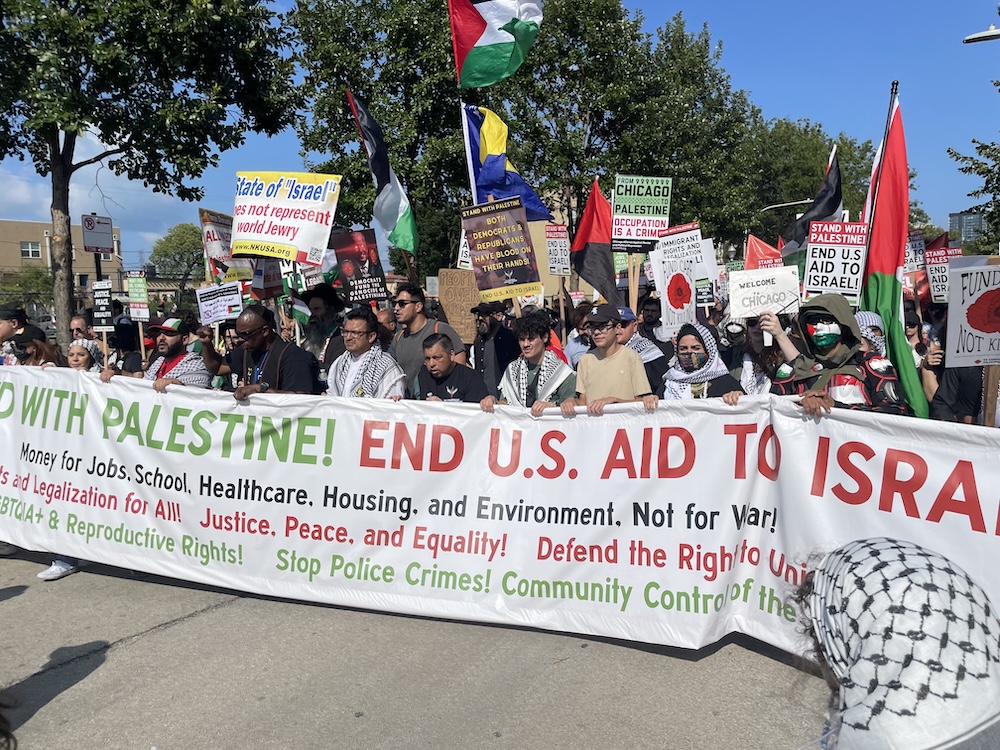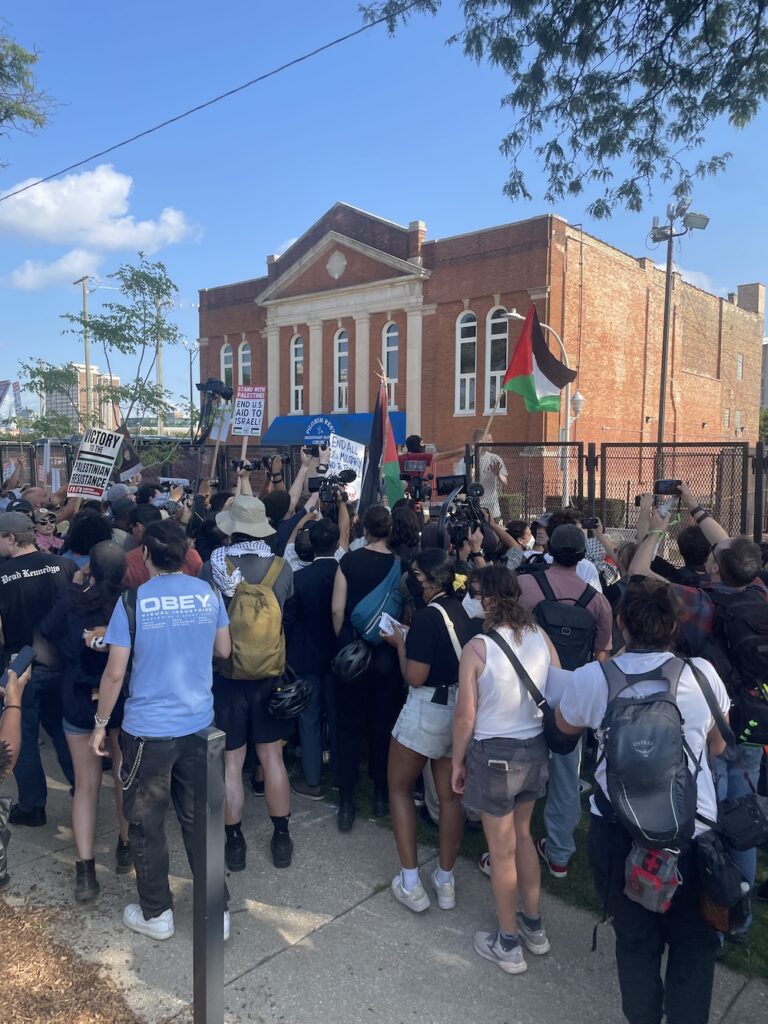CHICAGO—Monday was the first day in the office for DNC delegates. But as they clocked in at the United Center, so too did the pro-Palestine movement that is looking to centralize the 40,000 lives that have been lost since last year to the Israeli invasion. The Coalition to March on the DNC held what will likely be the week’s biggest Palestine protest—a march that, according to a coalition spokesperson, was attended by 20,000.
“Those war criminals at the United Center think that having bombs, having a row of police, makes them powerful,” said speaker Kobi Guillory of the Chicago Alliance Against Racist and Political Repression at the pre-march rally in Union Park. “We have to fight for a better world because they will never, ever give it to us out of the goodness of their hearts.”

The Coalitions to March on the Republican National Convention and DNC were technically two groups, each led by local organizers in the conventions’ respective cities, but most of the organizations, staffers, and activist leaders attended and had a hand in planning both. Omar Flores, a lifelong Wisconsinite, oversaw the Milwaukee march last month — an event that proved to be organized, thoughtful, strategic, and above all (and despite concerns): safe.
When we caught up with Flores in Chicago, he was as we left him in July — giddy with solidarity.
“Lots of people here, so we’re feeling excited,” Flores said. One of them has fondly described to us that we’ve been like their older sibling. That we make all the mistakes, and they make sure not to make them again. It’s a much easier process for them, thankfully.
“I think [the media has] been a little trickier here with the questions about antisemitism, as if that’s an issue with our movement and not the right-wing movement. Other than that, I feel there’s been decent media coverage at both.”
The protesters were a diverse group, representing a wide range of organizations.
Arielle Rebekah is a member of Jewish Voice for Peace in Chicago.
“When talking to people who may not politically share our values,” Rebekah said, “always begin with leaning into the values we do share. I think it’s a pretty universal value to say that everybody — whether they are black, brown, or white, rich ,or poor, born in Palestine or Chicago — deserves to be safe from violence in their own homes. Deserves to know that when they tuck their kids in bed at night, their kids will be alive, safe, and healthy when they wake up in the morning. When I’m talking with people who may not be politically in the same space as we are, I lean into the belief that all of us want a world where we are safe and free.”
Jorge Guiterrez works with Mijente, a national LatinX organization. “We’re out here in support of a free Palestine, in support of immigrant rights, LGBTQ rights, and workers’ rights, and to make a statement that the Democratic Party needs to listen to its people and the working class. We have members here in Chicago who wanted to come out here and support the march.
“A lot of us are Latino, a lot of us come from countries with civil unrest, there’s war, there’s been U.S. foreign policy that has displaced people. We understand what is happening. That’s why we’re here, standing for the Palestinian people.”
Liz Rathburn is the co-chair of the University of Illinois Chicago SDS.
“Don’t get me wrong, the March on RNC was stellar, beautiful, awesome, but this, this is activists from all over the country here, this is like – damn near 20,000 people. This is something else, this is history in the making,” Rathburn said.
“The biggest thing we can learn [from 1968] is the power of organizations and the power of building the broadest possible coalition. We can’t afford to just work with people we agree with we have to work with everyone we can unite with and fight with. Maybe we disagree with half a million points, but if we can agree on ending US aid to Israel and fighting for justice, peace, and equality, that’s what matters and we’re gonna organize around that. We have people from all over the country and reporters from all over the world. This is what happens when you actually organize, long-term, in advance and you reject sectarianism. When you reject the idea that you only have to work with people you agree with, this is the power of that – unity of action, not of ideas.”
Audari Tamayo is co-chair of the University of Wisconsin Milwaukee SDS. Tamayo told us that there are some efforts to work within the party:
“Some folks have asked for Palestine resolutions within the convention but we believe our power’s in the streets,” Tamayo said. “That’s why the Democrats and Republicans have tried to stop us by taking the streets themselves. They don’t mind too much that we signed up for the convention, to take part in the conventions because that’s not as effective as taking the streets and building a movement on the streets.
“After the march today, we’re going to clean up and prepare for the next one. There’s a march on Thursday sponsored by the coalition, as well as on Wednesday by the Chicago Coalition for Justice in Palestine so it’ll be a busy week.
As speakers and performers from the Palestinian Feminist Collective, Mijente, and even third-party presidential candidate Cornel West took the stage, the distinctive, rosy tones of women-led social justice organization Code Pink were front and center.
Even though it was the first day of the convention, the group had already been busy in Chicago. Co-founder Jodie Edan told 48hills that on Sunday, Code Pink had infiltrated the city of Chicago’s delegate party at Navy Pier—and interrupted it with Palestinian messaging three times.
“What we’re watching is a lot of feminists who are not standing with women in Gaza,” said Edan. We are watching children being murdered, and women in America being silent. That’s where it stands.”
“You are witnessing democracy right now,” she continued. “Voting is owned by the rich. The only moment we have for democracy is the next two and a half months, to raise our voices for what we need, to make them uncomfortable.”
Code Pink also showed out in force for the week’s first major protest, a reproductive justice-focused march on Sunday night. In 1968, the horrific brutality wielded against DNC protestors by Chicago police kicked off on Sunday in Grant Park. What had been the police dynamic on Sunday?
“So it’s funny, there were a lot of them, and they were hovering. They weren’t really in our faces, they didn’t disrupt in any way,” said Edan. “I think what’s more disruptive is if you get near the fences, you start to breach where the delegates are—I think that’s what they’re more worried about. But last night was quite a beautiful, feminist march.”
On Monday’s march, the coalition’s marshals were careful to stay between protestors and the police, who flanked the parade route on both sides of the street, forming a cordon with their bikes.
But Edan was correct that cops weren’t going to tolerate demonstrators getting closer than planned to the convention. The march’s midpoint was at Park #578, the closest it got to the United Center, and still two blocks away. After another brief program of speakers, a vast majority of marchers headed back to Union Park.

But others hung back, banging their protest signs against one of the metal barriers that separated them from the Democrats. Then, someone dismantled a panel of the metal wall, then another. On the other side, officers began to mass up, the new arrivals wearing powder-blue riot helmets and face masks.
“The whole world is watching,” many in the crowd began to chant as a face-off took shape between the breached cordon and another that was still standing. The phrase was ominous, given its original use by 1968 anti-war protestors who faced intense police brutality in Grant Park.
Some protestors refused to retreat and were forcibly detained. For an interminable moment, the few who were left—and members of the press, who by that point seemed to outnumber protestors four to one—stared down the cops. Chicago PD surrounded Park #578 on three sides, slowing forcing protestors and media into the street with a low chant of “Move. Back.” Many obliged so as not to get kettled.

Four were arrested, according to the Chicago PD.
Coalition spokesperson Faayani Aboma Mijana said march organizers had already headed back to Union Park when the altercation took place and had little information on the run-in, or the individuals who had been detained.
“The organizers’ goals were clear: march on the DNC, march within sight and sound,” Mijana told us Monday night. “We were clear on what we were going to do and that’s what we did.”
Indeed, Mijana saw the overwhelmingly peaceful protest as a promising kick-off to a week of people making their voices heard.
“I saw relief because we put so much effort into the march and it went off really well. And empowerment, because it was a big, collective effort.”






